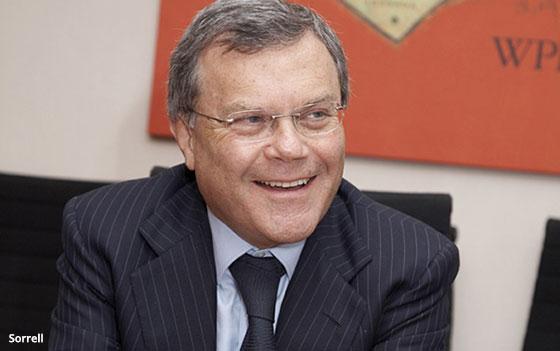
While agency forecasters (including those at WPP’s GroupM) are predicting
advertising growth of more than 4% next year, WPP CEO Martin Sorrell told a UBS media conference crowd in New York today that he would "contain any enthusiasm" about next year’s prospects
despite the moderately rosy predictions.
WPP has previously indicated that it expects to be "broadly flat" growth-wise for 2017 and Sorrell told the UBS gathering that the holding company is
still working through budgets for next year and did not offer a growth estimate for the firm for 2018. What he did say was "I’d be very conservative" with any estimate, given continuing
pressures on many of the firm’s clients.
The good news for WPP is that the company has done well on the new business front this year and will completely cycle through two huge 2016
losses — AT&T and Volkswagen —by January 2018. Also helping next year’s outlook a bit, he added, is the "structural benefit" of several special events like the Olympics and
soccer’s World Cup.
advertisement
advertisement
Sorrell also touched on the recent statement by Ford — WPP’s largest global client — that it is reevaluating its marketing model. Asked what that meant, Sorrell replied, "it
means what they say. They want to be fit for the future."
WPP and Ford are currently discussing their relationship going forward. "We think the integrated model works best," Sorrell said. From
Ford’s perspective, he added, one business model issue is how to optimally combine its marketing and sales functions for greater marketplace impact.
As for the outcome of the ongoing
discussions, Sorrell said, “if we respond proactively I’m sure it will positive.”
Sorrell also touched on the digital giants, noting that Google and Facebook remain the two
largest media companies that WPP invests with on behalf of clients. And Google is also a major client, he noted.
Of the estimated $100 billion that Google generates in revenue each year, WPP
estimates that 70% of that revenue is generated by the "long tail" of smaller advertisers. That long tail, Sorrell added, also represents an opportunity for WPP — an opportunity
currently under consideration.
Going forward, Sorrell said, the keys to growth are innovation and focus on brand — areas where the holding companies are in a position to help.
But “the days of market share growth by multiple brands are gone,” he said. “You need an organization that functions as one.” He pointed to the ongoing effort at WPP’s
Ogilvy, where CEO John Seifert is trying to create "one Ogilvy." Over the years, the agency has developed numerous sub-brands — so many, Sorrell acknowledged, that even he wasn’t
aware of all of them.
The merger of MEC and Maxus is another example, Sorrell said — emphasizing that the general idea was to execute “thoughtful consolidation, not an irrational
rush, to achieve the benefits of one company.”
“Unnecessary duplication is out,” Sorrell added. Linking data with media is critical. Agencies that can do that in meaningful
ways for clients, he said, will win.
Another way that agencies can win, he added, is by "going into the digital door" to serve clients, which if done skillfully can lead to broader AOR
assignments.
Commenting on the proposed new U.S. tax legislation, WPP Group Finance Director Paul Richardson said the changes would be “very positive” for WPP, resulting in a tax
bracket of between 20% and 25% in the firm’s two largest markets — the U.S. and the UK. The company had been anticipating a 35% U.S. tax bill under the proposed legislation.